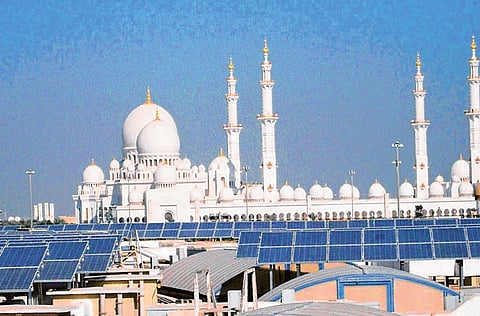Powerful boost for clean energy
The country is investing heavily in renewable power and is turning into a global centre for discussions of various strategies

Abu Dhabi: The United Arab Emirates, one of the world's top oil producers, is investing heavily in renewable energy today to maintain its world status as an energy supplier — this time through clean energy. It's a reputation that is being maintained at a high cost.
"Since the inception of the country, we have been well invested in the oil and gas sector," said Dr Sultan Al Jaber, chief executive officer of Masdar, the Abu Dhabi government-backed renewable energy company. "Since then, the UAE and Abu Dhabi have created different vehicles that will help secure the future of Abu Dhabi and the country and secure what is required for future generations," he told Gulf News.
"The revenues from the oil and gas sector are being reinvested in securing the future of the nation. It's a future that will have to provide the right platforms to revive economies and provide the necessary jobs for generations to come," he said.
That is one reason why Masdar exists today.
However, the building of this portfolio has been through a number of achievements, including Masdar. Another has been through the hosting of Irena (International Renewable Energy Agency), an international organisation that could help transition the world to a clean energy future, in Abu Dhabi. The agency was officially established in January 2009.
"Abu Dhabi came in with a very strong strategy to what it would offer to host Irena," said Adnan Ameen, director general of Irena. "It's of great significance from two points of view. One is to have an oil producing country hosting the international organisation for renewable energy which really shows the imagination behind it, and two, it's a huge strategic opportunity for this region to build its future as an energy economy and not just as a hydrocarbon economy."
Ameen said that Abu Dhabi's investments both in the capital and internationally have put the country in very positive light for the future. "The UAE is very smart in one way. They [the UAE] have understood globalisation better than most people. Globalisation of production means you don't necessarily have to have a geographical reference as to where you are doing your work," he said.
"Essentially they have invested in turning Abu Dhabi into a global centre for renewable energy discussion. You have the international organisation for renewable energy here. All the ministers for energy come together here once a year. You have the World Future Energy Summit with the entire private sector leaders there. You have the Zayed Energy Prize and then you have the Masdar Institute of Science and Technology with MIT where you are training the leaders of the future on renewable energy."
Solar investments
"The other part of the puzzle which they are really smart about is that they have strategic investments all over the world in big renewable energy plants. They have solar investments in Spain and in Germany. They have wind investments in the UK. They're looking at investing in China and different parts of the world. This means that you will have a network of cutting-edge industries owned by the UAE which are able to network in terms of technology experience and are able to feed back into Abu Dhabi," Ameen said.
The World Future Energy Summit (WFES), which has been taking place annually in Abu Dhabi since 2008, has generated a lot of interest in Abu Dhabi on the world stage when it comes to the future energy sector.
"The summit has grown into the world's foremost gathering of communities dedicated to clean and renewable energy, energy efficiency and the environment — from 5,000 visitors to 26,000 last year, including royalty, heads of state, ministers, senior business people, industry experts and leading academics," said Naji Al Haddad, exhibition director.
Challenges
"Considering the volume and quality of the attendance at WFES over the last five years, it is clear that the summit is now well established as the main global forum for debate and action on future energy and sustainability," he said. "And this prestigious international event is happening here in Abu Dhabi; that's a tremendous milestone."
Robin Mills, a Dubai-based energy strategist and economist, agrees that the state of the renewable energy sector in the UAE, while it's still in its "early days," is one that will develop a lot in the next few years. "We're starting to see some businesses established in the renewable energy sector, but they face challenges in getting their business going," he said.
According to Georgine Roodenrys, CEO of the Clean Energy Business Council in Abu Dhabi, the emirate's commitment to renewable energy is beginning to bear fruit. Milestones include the conclusion of the Shams 1 financing for delivery of 110 MW of Concentrated Solar Power, she said.



